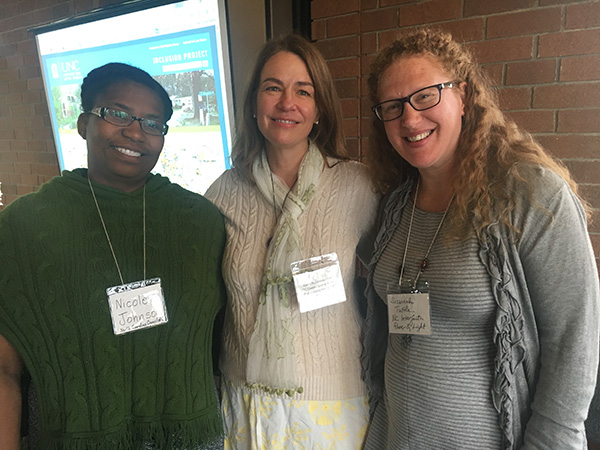The Many Paths that Lead to Creation Justice

“Diversity” was the key word for “Creation Justice Pathways in North Carolina,” the interfaith, multifaceted summit cosponsored by the Creation Justice Network of the UCC’s Southern Conference and the North Carolina Council of Churches on March 24-26.
The presenters at the conference represented a broad spectrum of expertise, background, and experience. Dr. Daniel Vermeer, the director of Duke University’s EDGE (Energy Development and the Global Environment) Center, spoke on the basic concepts of energy and the difficulty of bringing change to massive energy/utilities systems. He also warned that in our urgency to push for renewables, we must not forget the essential, if seemingly old-fashioned, task of energy conservation within our current systems.
Dr. Vermeer was followed by Marilynn Marsh-Robinson of the Environmental Defense Fund, who spoke of the origin of the term “environmental racism,” arising from mass protests against PCB contamination in the African-American community of Warren County, NC, and the evolution of the environmental justice movement from this event.
Activist Tracey Brown Edwards spoke of the catastrophic health and financial consequences suffered by her community of Walnut Cove, NC, from coal ash contamination by Duke Energy’s coal-burning plant located there.
Rev. Dr. Rodney Sadler of the Justice Action Mobilization Network and the NC NAACP spoke of the uncomfortable spectre of white privilege embedded in the environmental movement and of the links between poverty and environmental degradation. He further pointed to the transition to renewables as a way forward for impoverished communities.
Susannah Tuttle, director of NC Interfaith Power & Light, and Nicole Johnson of the NC Council of Church’s Health and Wellness Program, spoke in a similar fashion on the links between zip code, environmentally at-risk communities, and health. An additional topic was the necessity of defining for ourselves “What is ENOUGH?”
Equally as diverse as the summit’s presenters, those gathered to hear them represented the Christian, Jewish, and Muslims faiths, as well as a broad sample of denominations beyond the UCC. Participants were African-American, Latina, and white, young and elderly, seasoned activists and newcomers to environmental justice issues. The mix of faiths, ethnicities, and zip codes and multiplicity of voices created an energized environment of curiosity and sharing, and an opportunity for community-building around an issue—the protection of God’s beloved Creation—that unifies us all.
Rev. Karen Richardson Dunn is the facilitator of the Creation Justice Network of the UCC’s Southern Conference, and a consultant to Wake Forest University School of Divinity’s Food, Faith and Ecological Well-Being program. She lives in Asheville, NC, with her two sons, and is a member of First Congregational UCC.
Related News
Joy, Love, and Climate Action: A Church Draws from Ayana Elizabeth Johnson
At First Congregational Church, UCC, in Colorado Springs, CO, our Climate Justice Leadership...
Read MoreAn ally experiences PRIDE in the CLE
Advocacy and Action for Women's and Gender Justice Local events stir thoughts and...
Read MoreVote for Climate Hope Congregation Toolkit
After having witnessed the wonderful Climate Hope art of UCC children and youth, we are now...
Read More

